The Dong Thap Muoi (Plain of Reeds) region in the Mekong Delta is just hitting the peak of flooding season, a time for the southern province of Long An to show off the charming natural beauty of its vast wetland areas.
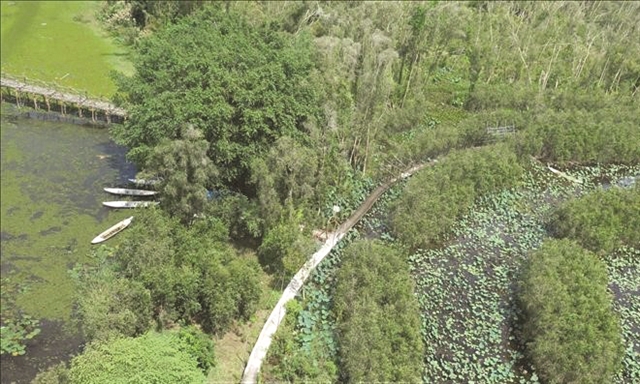
Melaleuca forest at Tan Lap Floating Village is seen from above. — VNA/VNS Photo Minh Hung
Like many other regions in the country, the COVID-19 pandemic has all but wiped out tourism in the region, but it is now mobilising a wide-scale plan to recover.
Coronavirus aside, the province faces another threat. With its large swathes of low lying wetland, it is at particular risk from climate change, with a study from Can Tho University estimating that if sea levels rose by just one metre almost half the province would be underwater. Long An needs tourism but it also needs to be eco-conscious.
It is with this in mind that it wants to pivot to green tourism with a focus on the eco-friendly “smoke-free” industry, putting its diverse waterways, wetlands and attractive eco-biological tourism activities such as botanical gardens, wildlife and forest discovery.
Located in the Mekong Delta area in the Dong Thap Muoi sub-region, the province is a gateway connecting HCM City, the country’s largest economic centre, to all the far southwestern provinces.
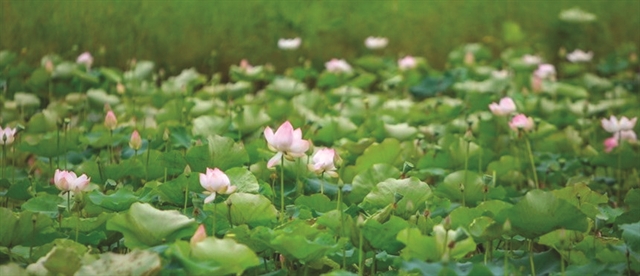
The lotus pond on Dat Phuong Nam farm is an inspiration for tourists. — VNA/VNS Photo: Nguyen Luan
Currently, the province is taking advantage of its unique natural scenery during the flooding season to lure visitors back to the area after the long social distancing of the pandemic.
Tourism agencies are making the most of short-term tours with departures from HCM City to popular tourist destinations, including the ancient house of hundreds of pillars in Long Huu Dong Commune, Tan Lap floating village, Dong Thap Muoi eco-tourism area, and Lang Sen Reserve.
The Ramsar Convention signed in 1971 is an international treaty for the conservation of wetlands, and Lang Sen Reserve was recognised as the seventh Ramsar site in Viet Nam in 2015.
The site, located in the south of Long An, still preserves the original ecosystem of the Dong Thap Muoi Wetlands in the country's Mekong Delta, similar to Tram Chim National Park in the neighbouring province of Dong Thap.
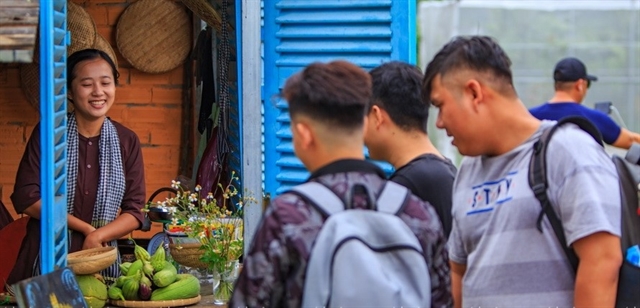
Visitors are always impressed by the hospitality of local people when visiting Dat Phuong Nam Farm in Long An. — VNA/VNS Photo Nguyen Luan
Another well-known destination is Phuoc Loc Tho Ancient Village (in Huu Thanh Commune, Duc Hoa District), a 5-hectare area that is home to 22 ancient houses and thousands of antiquities.
The eco-tourism site of Canh Dong Bat Tan (Endless Field) in Moc Hoa District, has a number of services such as saunas, soaking in medicinal herbs, visiting primaeval melaleuca forests as well as a wealth of rare flora and fauna.
Tan An, the capital of the province, only 47km from HCM City, is home to the ancient Thien Phuoc Pagoda, Long An Museum, Long An Monument Park, and the Mausoleum of Nguyen Huynh Duc. In addition, there are a number of new private tourist attractions in Long An such as Southern Land Organic Farm, the Seven Wonders of the World Park and Happyland.
While it is obvious that the province has huge resources and advantages in terms of tourism development, harnessing them in a sustainable fashion is another matter, and requires the locality to create unique experience with their own characteristics, officials and experts said.
Chairman of Long An Provincial People's Committee Nguyen Van Ut said he believed that a key way for the province to enhance its appeal would be by closely following the provincial tourism development master plan with a vision to 2030, effectively exploiting its local comparative advantages.
“The province’s tourism value is created based on specific characteristics of local tourism resources and geographical conditions. They include Dong Thap Muoi wetland eco-system, cultural activities, entertainment spaces with quality service,” the official said.
“Also from this strength, the province can build appropriate mechanisms and promulgate policies for tourism and travel businesses, paying attention to investment in local diversified tourism products and promotion programmes.”
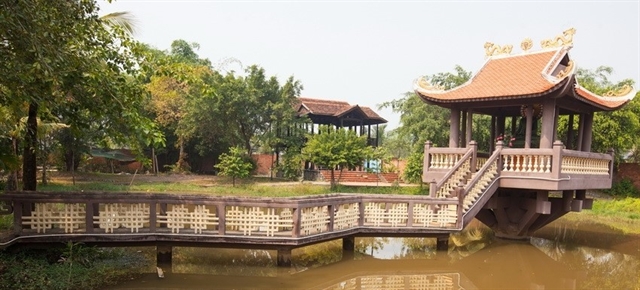
A one-pillar-pagoda in Phuoc Loc Tho ancient village. — VNA/VNS Photo Le Minh
The Director of the Long An Province's Department of Culture, Sports and Tourism, Nguyen Anh Dung, said eco-tourism products associated with the Dong Thap Muoi region were considered highlights of the province.
"For example, Lang Sen Wetland Reserve in the communes of Vinh Dai, Vinh Loi va Vinh Chau A, Tan Hung District, retains many natural and unspoiled features and is less affected by humans. With 4,800 hectares, and home to over 300 species of wild plants and vertebrates, including 13 species listed in the Viet Nam Red Book, the reserve is one of the top destinations to attract tourism to Long An," Dung said.
"Another eco-tourism site, Tan Lap Floating Village, has charming river scenery, lotus flowers and water lilies blooming on the canal, and is a unique route through the melaleuca forest. The seasonal food has become an experience and the resort destination brings many impressions to visitors."
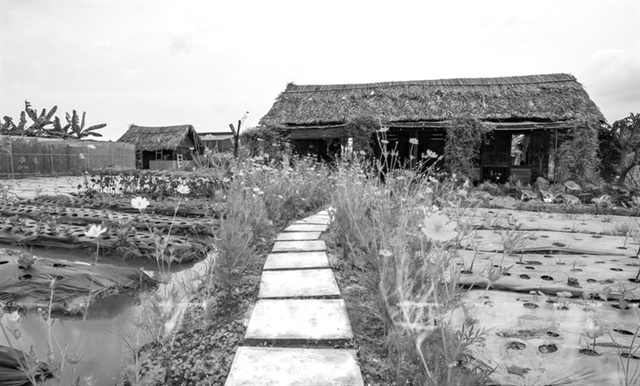
The peaceful beauty of a flower garden at Dat Phuong Nam farm is typical of the southern countryside in Long An. — VNA/VNS Photo Nguyen Luan
The Plain of Reeds is also home to Canh Dong Bat Tan tourist area which offers visitors a feeling of relaxation, comfort and is suitable for discovery, travel and healthcare due to its cool and pure space amid the scent of Viet Nam's unique primaeval melaleuca forests, according to the official.
Bui Dac Thang, director of the area’s research centre, said as soon as the COVID-19 pandemic was under control, the Canh Dong Bat Tan tourism area would be ready to welcome back visitors with products and services focusing on presenting experiences, such as the "Forest of Herbal Medicines" tour, which gives people the chance to participate in the distillation of herbal essential oils and enjoy the specialities of the floating season
Aside from eco-tourism, historical-cultural relics and craft villages are also central to Long An tourism. The province has 121 heritages, of which 21 have national recognition.
With its special and unique tourist offerings, Long An is now concerned with creating a solid brand so that the industry can be an important economic sector. It is said that a rising tide lifts all the boats, and so the province wants an enhanced tourism industry to benefit all people and authorities at all levels.
Though Long An tourism is outstanding, many of the province’s resources have not been used to their full potential.
Dr Ngo Thanh Loan from HCM City National University and Le Hoang Quoc Viet from Taylor's University in Malaysia suggested solutions to create added value for tourism in Long An, using Can Duoc District as a good example of developing the industry in a wetland region.
"With features of wet-rice traditional culture, the area has many interlaced rivers and canals. By exploring and conquering nature, fighting against foreign invaders and building the homeland, the ancestors have handed down much cultural heritage such as the House of Hundred Pillars, Van Phuoc Temple, the worshipping place of the Nguyen Quang Dai, and Master Ba Doi, one of the ancestors of cai luong (reformed opera) in the South," Loan said.
“Can Duoc should be a highlight of tourism as it is home to many famous traditional crafts such as mat weaving, boat building, wood carving and puff pastry making.”
Other experts suggested the province should pay attention to waterway traffic for tourism development. Waterway routes connecting HCM City and Can Duoc have long been used as the main route for traders to transport and exchange goods between HCM City and the wetland region.
In addition, the province also needs to increase the quantity and improve the quality of direct tours from HCM City to the Plain of Reeds, particularly after the pandemic is under control.
In the first 10 months of 2021, the number of visitors to Long An reached 290,000, down 40 per cent compared to the same period last year. The province has set a target of welcoming about 420,000 visitors in 2022, including 2,000 foreigners.
If the province is able to successfully pivot to eco-travel and effectively highlight its incredible wetlands, waterways and cultural heritage, it could be all set to be one of the finest tourist magnets in the country.
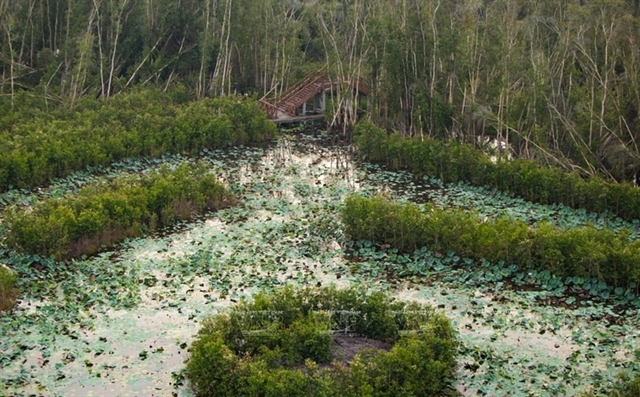
A corner of the melaleuca forest in the floating village of Tan Lap. — VNA/VNS Photo Nguyen Luan